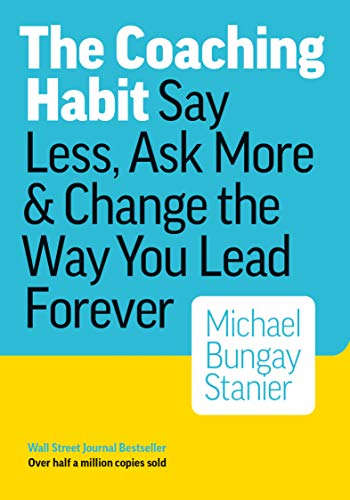The Coaching Habit: Say Less, Ask More & Change the Way You Lead Forever

It’s an uncomfortable conversation. There is a group of change practitioners who believe coaching is required to accomplish change. I’m not convinced. However, to investigate the premise a bit, I picked up The Coaching Habit: Say Less, Ask More & Change the Way You Lead Forever. Along the way, I discovered why it’s possible that I’m not so convinced that coaching is essential yet others are.
Good Leadership
Leadership isn’t easy to describe. Joseph Rost spent the better part of his book, Leadership for the Twenty-First Century, just trying. However, there are aspects of leadership that many believe are important. Robert Greenleaf is known for his work on Servant Leadership. Daniel Goleman and his colleagues make the case for emotional intelligence in leadership in Primal Leadership. Liz Wiseman talks about the way that leaders bring out the best in others in Multipliers. Patrick Lencioni lays out his perspective in The Advantage. Everyone seems to have their own perspective on what good leadership is.
There are, however, common threads that run through the conversation. In Heroic Leadership, Chris Lowney explains how the Jesuits listened to the environments they were in and demonstrated behaviors rather than relying on rules. It turns out that good leaders are leaders that listen.
Motivational Interviewing
For me, every leader and manager should be taught Motivational Interviewing. The skills are based on listening and are designed to help even the most stubborn resistors to accept that there are changes in their life that can make their lives better. The rub between this and coaching is that motivational interviewing starts with listening and recognizes that the person is the expert in their lives.
Coaching provides the appearance of listening before giving advice – but that’s the rub. The expectation is that the coach will provide their advice and expertise. Built on the wisdom of Carl Rogers, motivational interviewing respects the individual. (See A Way of Being for more.) So perhaps my issue with coaching isn’t that I don’t believe it’s valuable – it’s that I believe it’s often not done well. Anyone can call themselves a coach without understanding how people are effectively moved to better performance.
Victim, Persecutor, and Rescuer
The triangle goes by different labels. In my Hurtful, Hurt, Hurting post, I explained the triangle with the labels of victim, villain, and the rescuer. Whatever labels are in use, the power dynamics remain the same. The dysfunctional system is fueled by the relationships and the need to see people in one of these key roles. One of the best functions of a coach is to break people out of these sick cycles and get them to higher levels of functioning.
The trick may be to view the roles differently and to see how the dysfunction of the systems impacts our ability to see ourselves. (See Beyond Boundaries for more.)
Performance Coaching
Coaching does add value. Anders Ericsson and Robert Pool make this clear in Peak. However, at the same time, the ability to assess the value of the coaching is difficult. Because we have no expertise in what it takes to get to coaching quality, it’s hard for us to determine if our coach is good or not. This is the same problem that we have with finding an appropriate counselor. (See The Heart and Soul of Change for the challenges.)
So, I think that there is value to coaching when done well. Perhaps the best way to generate value with coaching is to turn your leadership into The Coaching Habit.
